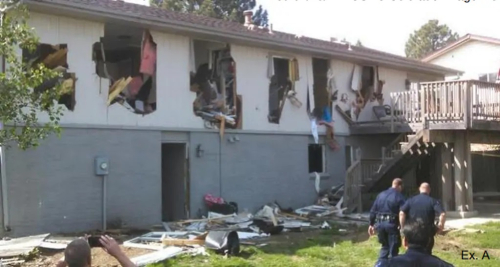We’re back again at that supposed distinction between the police power and the eminent domain power, which reminds us of that old tale about President Lyndon Johnson:
After reviewing a contingent of Viet Nam-bound Marines in California, Lyndon Johnson strode purposefully toward what he thought was his helicopter. “That’s your helicopter over there, sir,” said an officer, steering the President toward a different craft.
“Son,” replied Johnson evenly, “they are all my helicopters.”
Well, it’s all government power.
But not to the Tenth Circuit, which in this unpublished order concluded that when local SWAT teams destroyed an innocent family’s house to dislodge a fleeing suspect who had for hours holed up there and taken shots at the police, it wasn’t a taking because, guess what, the police were not exercising eminent domain power, it was the police doing what police do.
The Tenth Circuit relied on the fact that this was a physical taking (and not a regulatory taking). You might think that it would be better for the owners to have characterized it as a physical taking because those are per se takings. No, because this was a physical occupation pursuant to the police power and not pursuant to some regulation, the usual Loretto rule doesn’t apply, the court concluded.
But we thought the regulatory takings doctrine wasn’t necessarily built on the idea that it was only regulations that can take property, but the recognition that any action by government where it does not recognize its obligation to pay compensation could be a taking, aka inverse condemnation.
The court also relied on the “nuisance” or “necessity” rule in takings, which finds no taking if property is destroyed in order to prevent a greater public harm. You know, cedar rust and stuff. The idea there’s no taking if your property needs to be destroyed for the greater good.
So suck it up, property owners. Police destroyed your house chasing a bad guy. Not your fault, but you get to bear the entire burden.
Not that we’re terribly surprised by this ruling as grossly unfair as it is, mind you. Pretty typical. Customs agents inspect and seize your laptop at the border to check it out but destroy the data on the hard drive? No taking. DEA holds your legal prescription drugs as evidence against a third party but eventually don’t use the evidence and return it to you (but by then the drugs have expired)? No taking.
Not every jurisdiction goes that way, however.
More on the decision from the Washington Post here.
Order and Judgment, Lech v. Jackson, No. 18-1051 (10th Cir. Oct. 29, 2019)
